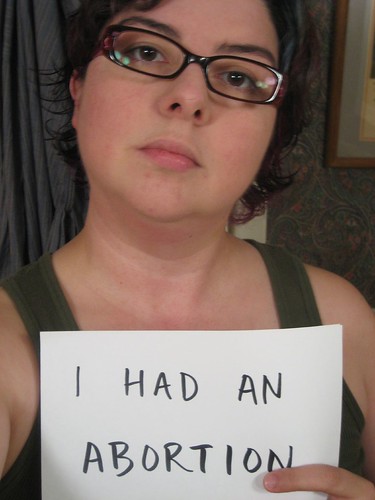
Can you see a black woman holding up a sign like this? Image by yarnivore via Flickr/Creative Commons
As I progress with subsequent drafts of my book, I’ve been meeting with another writer for accountability and feedback. In a recent session, we talked—in hushed tones in a coffee shop—about my book being full of themes and situations black women don’t talk about within their own families. They may discuss these topics with their friends—depending on their generation and how adamant the family is about not putting its business out into the street—but I believe most black women keep a lot of stuff hidden.
I thought about my conversation with my writer friend Sunday as I attended “The Roe Monologues,†a local event that commemorated the Roe v. Wade decision with true stories from real women and men who had some experience with abortion, both before and after its legalization. I have no experience with abortion (or pregnancy for that matter), but I volunteered to read two stories by women who had sent their stories in. I was the only non-white reader, and I’m 98% sure I was the only non-white person at the event. If it’s true that black women have abortions at 3½ times the rate of white women (see p. 7), I should not have been the only one there.
Many of the stories read were by women who gave only their first names or who chose to remain anonymous, so they could have been stories submitted by black women, but my instinct and knowledge of the group that sponsored the event tell me otherwise. As with a lot of pro-choice groups, middle-aged white women dominate this one’s board of directors, and not many middle-aged white women have an abundance of black friends to help them reach out to the black community. (Nothing against any of the mainstream groups; it just is what it is.) And given black folks’ tendency to not want to air dirty laundry, especially in front of mixed company, I’m willing to bet no black women were represented at “The Roe Monologues.â€
But I see another factor at work: white privilege. As rabid as the anti-choice movement is (see this photo, too), white women have a better chance of being forgiven and accepted by the world at large for the “bad girl†behavior that resulted in the unwanted pregnancy and for the “immoral†act of abortion to get rid of an inconvenience than do black women.* And even if she’s not forgiven, a white woman won’t be seen as representing all white women. While she can’t share her story free from judgment, she can share it without the burden of making other women like her look bad.
This post is just an observation of cultural differences, but as the anti-choice movement gains more victories—and these wins disproportionately affect poor women, who are also disproportionately women of color—it’s one white women in the pro-choice movement should take note of if they want to protect the right to a safe, legal abortion for all women. As much as we would like to be past this point, we can’t disconnect race from every social movement yet.
Which is why I went. And why I wrote this.
*Just to be clear: I know birth control omission or failure during premarital sex isn’t the only reason women seek abortions.
